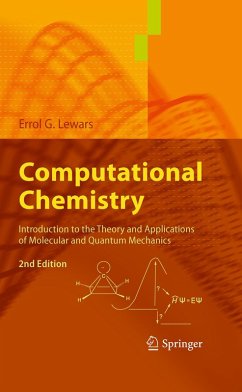The second edition of this popular textbook has been revised to improve explanations and to add topics which were not featured in the first edition. It also contains extended, updated examples and references. The questions (the hallmark of a genuine textbook) at the end of each chapter fall into two classes: to test and reinforce the reader's understanding, and to encourage deeper thought. As in the first edition, all pivotal statements and examples are supported by original literature references, and these have been updated to 2009 and 2010. Many calculations included by the author serve to illustrate and to show the scope of various methods.
The main methodologies, e.g molecular mechanics, ab initio, semiempirical, and density functional theory (DFT), are introduced in a historical context (but without glossing over scientific detail) because the author believes that a scientific text should also be a humane exposition and not a collection of recipes.
This textbook is intended for undergraduate and graduate students working in computational and theoretical chemistry courses and for researchers in universities and industry to whom computational chemistry may be useful. It may be used for self-study or with an instructor.
"Errol Lewars has done it again. The author of "Modeling Marvels: Computational Anticipation of Novel Molecules" has written a new edition of another of his highly interesting and informative books, one that interleaves and interweaves rigorous theory, computational protocol, dare I say "classical chemistry", and biographical snapshots. Both the novice and practitioner will find much to enjoy and be educated by Lewars' decision to include easier questions, harder questions and answers that accompany the text." (Prof. Joel F. Liebman, University of Maryland, Baltimore County, UMBC, USA)
Review of 1st edition: "An Outstanding Academic Title" - Choice Magazine
The main methodologies, e.g molecular mechanics, ab initio, semiempirical, and density functional theory (DFT), are introduced in a historical context (but without glossing over scientific detail) because the author believes that a scientific text should also be a humane exposition and not a collection of recipes.
This textbook is intended for undergraduate and graduate students working in computational and theoretical chemistry courses and for researchers in universities and industry to whom computational chemistry may be useful. It may be used for self-study or with an instructor.
"Errol Lewars has done it again. The author of "Modeling Marvels: Computational Anticipation of Novel Molecules" has written a new edition of another of his highly interesting and informative books, one that interleaves and interweaves rigorous theory, computational protocol, dare I say "classical chemistry", and biographical snapshots. Both the novice and practitioner will find much to enjoy and be educated by Lewars' decision to include easier questions, harder questions and answers that accompany the text." (Prof. Joel F. Liebman, University of Maryland, Baltimore County, UMBC, USA)
Review of 1st edition: "An Outstanding Academic Title" - Choice Magazine
Dieser Download kann aus rechtlichen Gründen nur mit Rechnungsadresse in A, B, BG, CY, CZ, D, DK, EW, E, FIN, F, GR, HR, H, IRL, I, LT, L, LR, M, NL, PL, P, R, S, SLO, SK ausgeliefert werden.
Selected by Choice magazine as an Outstanding Academic Title for 2017
"This third edition by Lewars (Trent Univ., Peterborough, Ontario, Canada) continues the excellent treatment of computational chemistry (i.e., molecular modeling). ... This is a thoroughly outstanding and motivational text. Summing Up: Essential. Upper-division undergraduates and above; faculty and professionals." (A. E. Viste, Choice, Vol. 54 (10), June, 2017)
"This third edition by Lewars (Trent Univ., Peterborough, Ontario, Canada) continues the excellent treatment of computational chemistry (i.e., molecular modeling). ... This is a thoroughly outstanding and motivational text. Summing Up: Essential. Upper-division undergraduates and above; faculty and professionals." (A. E. Viste, Choice, Vol. 54 (10), June, 2017)

